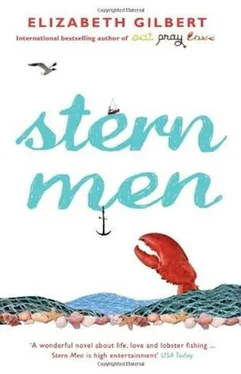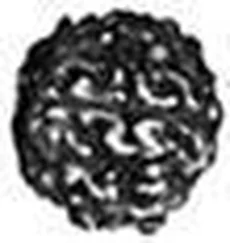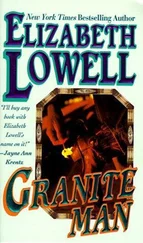Elizabeth Gilbert - Stern Men
Здесь есть возможность читать онлайн «Elizabeth Gilbert - Stern Men» весь текст электронной книги совершенно бесплатно (целиком полную версию без сокращений). В некоторых случаях можно слушать аудио, скачать через торрент в формате fb2 и присутствует краткое содержание. Жанр: Современная проза, на английском языке. Описание произведения, (предисловие) а так же отзывы посетителей доступны на портале библиотеки ЛибКат.
- Название:Stern Men
- Автор:
- Жанр:
- Год:неизвестен
- ISBN:нет данных
- Рейтинг книги:3 / 5. Голосов: 1
-
Избранное:Добавить в избранное
- Отзывы:
-
Ваша оценка:
- 60
- 1
- 2
- 3
- 4
- 5
Stern Men: краткое содержание, описание и аннотация
Предлагаем к чтению аннотацию, описание, краткое содержание или предисловие (зависит от того, что написал сам автор книги «Stern Men»). Если вы не нашли необходимую информацию о книге — напишите в комментариях, мы постараемся отыскать её.
Stern Men — читать онлайн бесплатно полную книгу (весь текст) целиком
Ниже представлен текст книги, разбитый по страницам. Система сохранения места последней прочитанной страницы, позволяет с удобством читать онлайн бесплатно книгу «Stern Men», без необходимости каждый раз заново искать на чём Вы остановились. Поставьте закладку, и сможете в любой момент перейти на страницу, на которой закончили чтение.
Интервал:
Закладка:
Such was the case of Mrs. Pommeroy, who, in 1976, was the only widow in Fort Niles; that is, the only fisherman’s widow. She was the only woman who had lost her man to the sea. What did this status afford her? Very little. The fact that her husband had been a drunk who fell overboard on a calm sunny day lessened the catastrophic dimensions of the event, and as the years went by her tragedy was by and large forgotten. Mrs. Pommeroy was something of a calm sunny day herself, and she was so lovely that people had difficulty remembering to pity her.
Besides, she had managed well without a husband to support her. She had survived without Ira Pommeroy, and did not show the world any signs of suffering from her loss. She had her big house, which had been built and paid for long before she was born and was constructed so solidly that it required little upkeep. Not that anyone cared about upkeep. She had her garden. She had her sisters, who were irritating but devoted. She had Ruth Thomas for daughterly companionship. She had her sons, who, though pretty much a pack of deadbeats, were no worse deadbeats than anyone else’s sons, and they did contribute to their mother’s support.
The Pommeroy boys who stayed on the island had small incomes, of course, because they could work only as sternmen on other people’s boats. The incomes were small because the Pommeroy boats and Pommeroy territory and Pommeroy fishing gear had all been lost at the death of their father. The other men on the island had bought everything up for a pittance, and it could never be recovered. Because of this, and because of their natural laziness, the Pommeroy boys had no future on Fort Niles. They couldn’t, once they were grown men, start to assemble a fishing business. They grew up knowing this, so it came as no surprise that a few of them had left the island for good. And why not? They had no future at home.
Fagan, the middle child, was the only Pommeroy son with ambitions. He was the only one with a goal in life, and he pursued it successfully. He was working on a squalid little potato farm in a remote, landlocked county of northern Maine. He had always wanted to get away from the ocean, and that’s what he had done. He had always wanted to be a farmer. No seagulls, no wind. He sent money home to his mother. He called her every few weeks to tell her how the potato crop was doing. He said he hoped to be the foreman of the farm someday. He bored her senseless, but she was proud of him for having a job, and she was happy to get the money he sent.
Conway and John and Chester Pommeroy had joined the military, and Conway (a Navy man all the way, as he liked to say, as though he were an admiral) was lucky enough to have caught the last year or so of action in the Vietnam War. He was a sailor on a river patrol boat in a nasty area of contention. He had two tours of duty in Vietnam. He passed the first without injury, though he sent boastful and crude letters to his mother explaining in explicit detail how many of his buddies had bought it and exactly what stupid mistakes those idiots had made that caused them to buy it. He also described for his mother what his buddies’ bodies looked like after they’d bought it, and assured her that he would never buy it because he was too smart for that shit.
In 1972, Conway, on his second tour of duty, nearly bought it himself, with a bullet near the spine, but he got fixed up after six months in an Army hospital. He married the widow of one of his idiot buddies who really did buy it back on the river patrol boat, and he moved to Connecticut. He used a walking stick to get around. He collected disability. Conway was fine. Conway was not a drain on his widowed mother.
John and Chester had joined the Army. John was sent to Germany, where he stayed on after his Army service was over. What a Pommeroy boy could do with himself in a European country was beyond the imagination of Ruth Thomas, but nobody heard from John, so everyone assumed he was fine. Chester did his time in the Army, moved to California, indulged in a lot of drugs, and took up with some weirdoes who considered themselves fortunetellers. They called themselves the Gypsy Bandoleer Bandits.
The Gypsy Bandoleer Bandits traveled around in an old school bus, making money by reading palms and tarot cards, though Ruth heard they really made their money by selling marijuana. Ruth was pretty interested in that part of the story. She’d never tried marijuana herself, but was interested in it. Chester came back to visit the island once-without his Gypsy Bandit brothers-when Ruth Thomas was home from school, and he tried to give her some of his famous spiritual advice. This was back in 1974. He was wasted.
“What kind of advice do you want?” Chester asked. “I can give you all kinds.” He ticked off the different kinds on his fingers. “I can give you advice about your job, advice about your love life, advice about what to do, special advice, or regular advice.”
“Do you have any pot?” Ruth asked.
“Oh, yeah.”
“Can I try it? I mean, do you sell it to people? I have money. I could buy some.”
“I know a card trick.”
“I don’t think so, Chester.”
“Yes, I do know a card trick.” He shoved a pack of cards in Ruth’s face and slurred, “Pig a card.”
She wouldn’t pick one.
“Pig a card!” shouted Chester Pommeroy, the Gypsy Bandoleer Bandit.
“Why should I?”
“Pig a fuggin’ card! Come on! I already planted the fuggin’ card, and I know it’s the three of hearts, so pig the fuggin’ card, will ya?”
She wouldn’t. He threw the deck at the wall.
She asked, “Can I please try some pot now?”
He scowled and waved her out of his face. He kicked a table and called her a stupid bitch. He had really turned into a freak, Ruth decided, so she stayed out of his way the rest of the week. That all happened when Ruth was sixteen, and it was the last time she saw Chester Pommeroy. She heard he had a bunch of children but wasn’t married to anybody. She never did get any of his marijuana.
With four of the Pommeroy boys off the island for good, that left three living at home. Webster Pommeroy, who was the oldest and smartest, was small, stunted, depressed, shy, and gifted only at plowing through the mudflats for artifacts for Senator Simon Addams’s future Museum of Natural History. Webster brought no income to his mother, but he didn’t cost much. He still wore the clothes of his childhood and barely ate a thing. Mrs. Pommeroy loved him the most and worried about him the most, and didn’t care that he made no contribution to the family, as long as he wasn’t spending day after day on the couch with a pillow over his head, sighing mournfully.
At the other end was the well-known idiot Robin Pommeroy, the youngest. At seventeen, he was married to Opal from town and father of the enormous baby Eddie. Robin worked as a sternman on Ruth’s father’s boat. Ruth’s father more or less hated Robin Pommeroy because the kid would not shut up all day. Since overcoming his speech defect, Robin had become a ceaseless motor mouth. And he wouldn’t talk just to Ruth’s father, who was the only one there. He would talk to himself, too, as well as the lobsters. He’d get on the radio during breaks and talk to all the other lobster boats. Whenever he saw another lobster boat cruising nearby, he’d grab the radio and say to the approaching skipper, “Don’t you look pretty, coming along?” Then he’d turn off the microphone and wait for a reply, which was usually along the lines of “Stuff it, kid.” Sadly, he’d ask Ruth’s father, “How come nobody ever tells us we look pretty coming along?”
Robin was always dropping things off the boat accidentally. He’d somehow let the gaff slide out of his hands, and then he’d run down the length of the boat to catch it. Too late. This didn’t happen every day; it happened almost every day. It was a real annoyance to Ruth’s father, who’d back the boat and try to catch up with the tool. Ruth’s father had taken to keeping spares of all his tools, just in case. Ruth suggested that he attach a small buoy to each tool so that at least it would float. She called this “Robin-proofing.”
Читать дальшеИнтервал:
Закладка:
Похожие книги на «Stern Men»
Представляем Вашему вниманию похожие книги на «Stern Men» списком для выбора. Мы отобрали схожую по названию и смыслу литературу в надежде предоставить читателям больше вариантов отыскать новые, интересные, ещё непрочитанные произведения.
Обсуждение, отзывы о книге «Stern Men» и просто собственные мнения читателей. Оставьте ваши комментарии, напишите, что Вы думаете о произведении, его смысле или главных героях. Укажите что конкретно понравилось, а что нет, и почему Вы так считаете.









